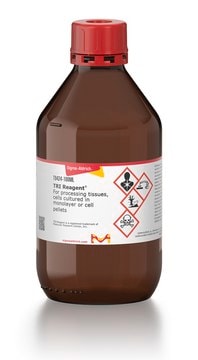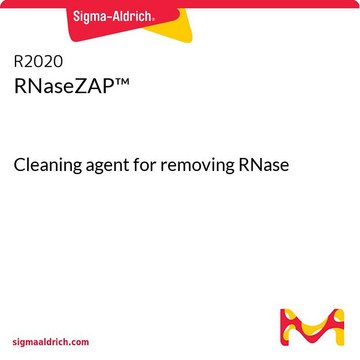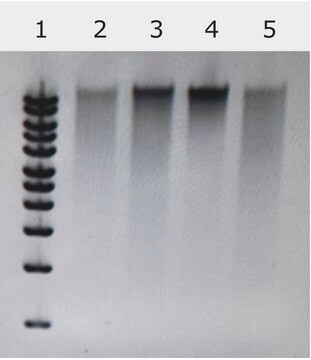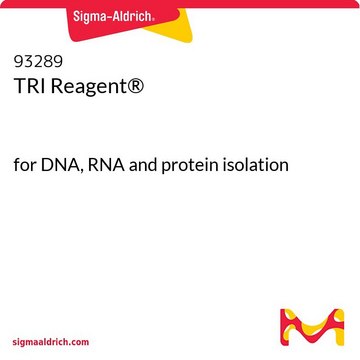추천 제품
Quality Level
SMILES string
N([C@@H]([C@H](O)C)C(=O)N[C@@H](CCC(=O)O)C(=O)N[C@@H](CCCNC(=N)N)C(=O)O)C(=O)[C@@H](NC(=O)[C@@H](NC(=O)[C@@H](NC(=O)[C@@H](NC(=O)[C@@H](N)CCCNC(=N)N)CC(=O)N)C)CC(C)C)C
InChI
1S/C37H67N15O13/c1-16(2)14-23(50-28(57)17(3)46-33(62)24(15-25(39)54)51-30(59)20(38)8-6-12-44-36(40)41)32(61)47-18(4)29(58)52-27(19(5)53)34(63)48-21(10-11-26(55)56)31(60)49-22(35(64)65)9-7-13-45-37(42)43/h16-24,27,53H,6-15,38H2,1-5H3,(H2,39,54)(H,46,62)(H,
InChI key
DUCQRBNNHJNRMP-KDDVYCELSA-N
일반 설명
RNAlater is compatible with most RNA isolation methods, including TRI Reagent and GenElute Total RNA isolation and mammalian mRNA isolation kits.
RNAlater is an aqueous, non-toxic tissue storage reagent that rapidly permeates tissue to stabilize and protect cellular RNA in situ in unfrozen specimens. Tissue pieces are harvested and immediately submerged in RNAlater for storage without jeopardizing the quality or quantity of RNA. RNAlater eliminates the need to immediately process tissue specimens or to freeze samples in liquid nitrogen for later processing. RNAlater preserves RNA in tissues for up to 1 day at 37 °C, 1 week at 25 °C, and 1 month at 4 °C. Tissues can also be stored at -20 °C long-term.
RNAlater has been extensively tested on several tissues from vertebrate species, including brain, heart, kidney, spleen, liver, testis, skeletal muscle, fat, lung, and thymus. RNAlater is also effective for E. coli, Drosophila, tissue culture cells, white blood cells, and some plants.
RNAlater is an aqueous, non-toxic tissue storage reagent that rapidly permeates tissue to stabilize and protect cellular RNA in situ in unfrozen specimens. Tissue pieces are harvested and immediately submerged in RNAlater for storage without jeopardizing the quality or quantity of RNA. RNAlater eliminates the need to immediately process tissue specimens or to freeze samples in liquid nitrogen for later processing. RNAlater preserves RNA in tissues for up to 1 day at 37 °C, 1 week at 25 °C, and 1 month at 4 °C. Tissues can also be stored at -20 °C long-term.
RNAlater has been extensively tested on several tissues from vertebrate species, including brain, heart, kidney, spleen, liver, testis, skeletal muscle, fat, lung, and thymus. RNAlater is also effective for E. coli, Drosophila, tissue culture cells, white blood cells, and some plants.
RNAlater can be used with various downstream applications including mRNA and total RNA isolation, histology and immunocytochemistry and is compatible with Sigma′s isolation kits.
애플리케이션
RNAlater® has been used to synthesize antisense RNA probe. It can be used with various downstream applications including mRNA and total RNA isolation, histology and immunocytochemistry and is compatible with Sigma′s GenElute™ isolation kits.
특징 및 장점
- No compromise in RNA quality following mRNA or total RNA isolation
- Rapidly permeates tissues to stabilize and protect cellular RNA
- Aqueous non-toxic solution allows downstream tissue processing
- Stabilizes samples at room temperature
기타 정보
RNAlater® is an aqueous, non-toxic tissue and cell storage reagent that stabilizes and protects cellular RNA in intact, unfrozen tissue and cell samples. RNAlater eliminates the need to immediately process samples or to freeze samples in liquid nitrogen for later processing.
원리
RNAlater is easy to use. Simply cut tissue samples to be stored so they are less than 0.5 cm in at least one dimension and submerge in 5 volumes of RNAlater. Small organs, such as rat kidney, liver or spleen can be stored in whole in RNAlater. When ready to isolate the RNA, remove the tissue from RNAlater and process as though just harvested. For cell storage, resuspend pelleted cells in a small amount of PBS before adding 5-10 volumes of RNAlater. Before preparing RNA, pellet cells and discard supernatant.
법적 정보
Licensed for distribution by Ambion, Inc., The RNA Company.
GenElute is a trademark of Sigma-Aldrich Co. LLC
RNAlater is a registered trademark of Ambion, Inc.
또한 이 제품과 함께 일반적으로 구입
Storage Class Code
12 - Non Combustible Liquids
WGK
WGK 1
Flash Point (°F)
Not applicable
Flash Point (°C)
Not applicable
The Wnt pathway regulator DKK1 is preferentially expressed in hormone-resistant breast tumours and in some common cancer types.
Forget MA
British Journal of Cancer, 96(4), 646-653 (2007)
Tina Jorsal et al.
Diabetologia, 61(2), 284-294 (2017-09-29)
Enteroendocrine K and L cells are pivotal in regulating appetite and glucose homeostasis. Knowledge of their distribution in humans is sparse and it is unknown whether alterations occur in type 2 diabetes. We aimed to evaluate the distribution of enteroendocrine
Jaret P Bilewitch et al.
BMC evolutionary biology, 11, 228-228 (2011-08-02)
The mitochondrial genome of the Octocorallia has several characteristics atypical for metazoans, including a novel gene suggested to function in DNA repair. This mtMutS gene is favored for octocoral molecular systematics, due to its high information content. Several hypotheses concerning
Bruno Arcà et al.
Scientific reports, 9(1), 2955-2955 (2019-03-01)
During blood feeding haematophagous arthropods inject into their hosts a cocktail of salivary proteins whose main role is to counteract host haemostasis, inflammation and immunity. However, animal body fluids are known to also carry miRNAs. To get insights into saliva
Vitellogenin gene expression in the intertidal blenny Lipophrys pholis: a new sentinel species for estrogenic chemical pollution monitoring in the European Atlantic coast?
Ferreira F
Comparative Biochemistry and Physiology. Toxicology & Pharmacology : CBP, 149(1), 58-64 (2009)
자사의 과학자팀은 생명 과학, 재료 과학, 화학 합성, 크로마토그래피, 분석 및 기타 많은 영역을 포함한 모든 과학 분야에 경험이 있습니다..
고객지원팀으로 연락바랍니다.








